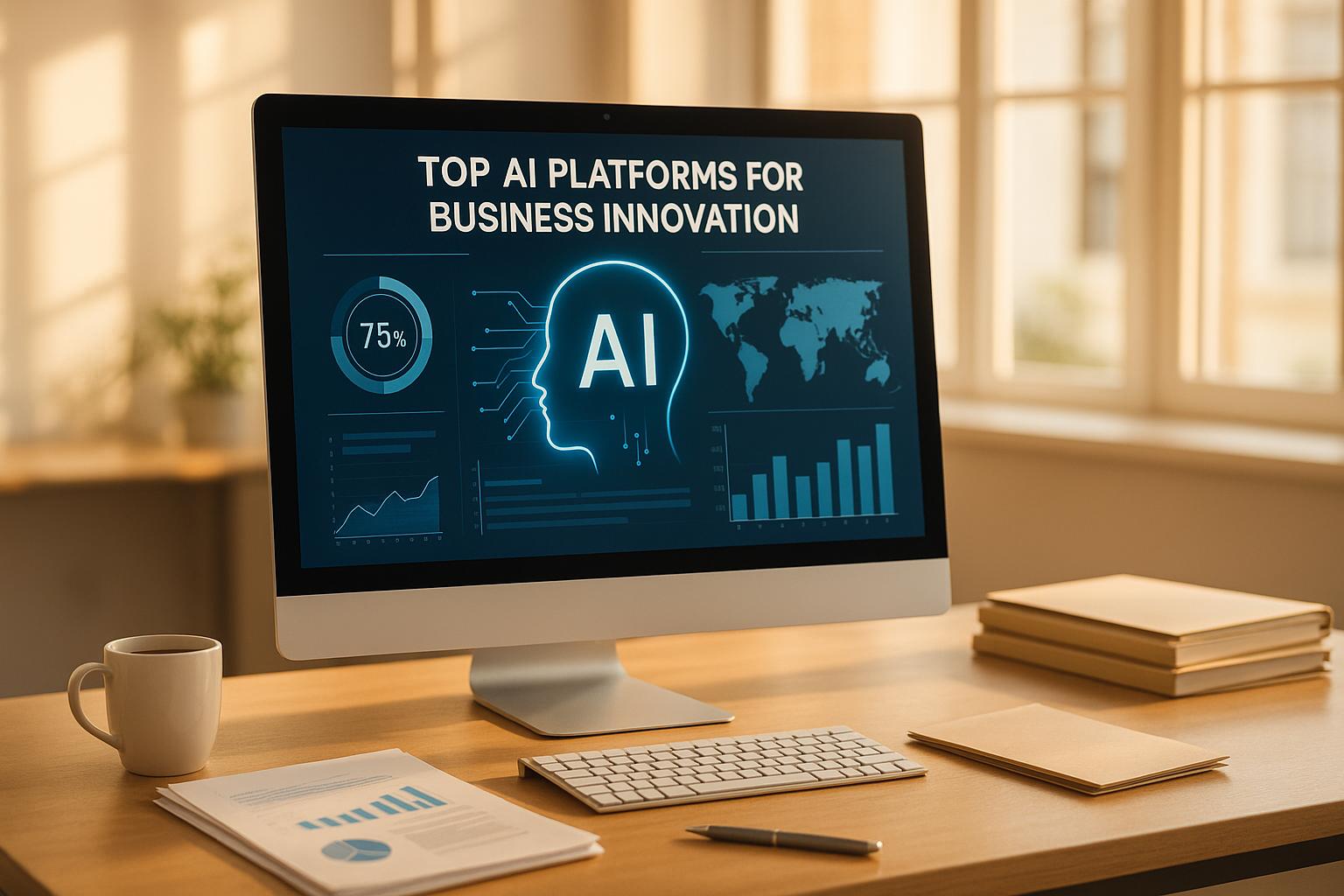
AI platforms are transforming business operations, helping companies cut costs, improve decision-making, and automate workflows. With tools like Prompts.ai, Domo, and Apache Airflow, businesses can unify multiple AI models, streamline processes, and gain real-time insights - all while maintaining security and controlling expenses. Here's a quick summary of key benefits:
Each platform offers unique strengths based on your business needs - whether it's cost transparency, scalability, or compliance. The right choice depends on your goals and operational priorities.
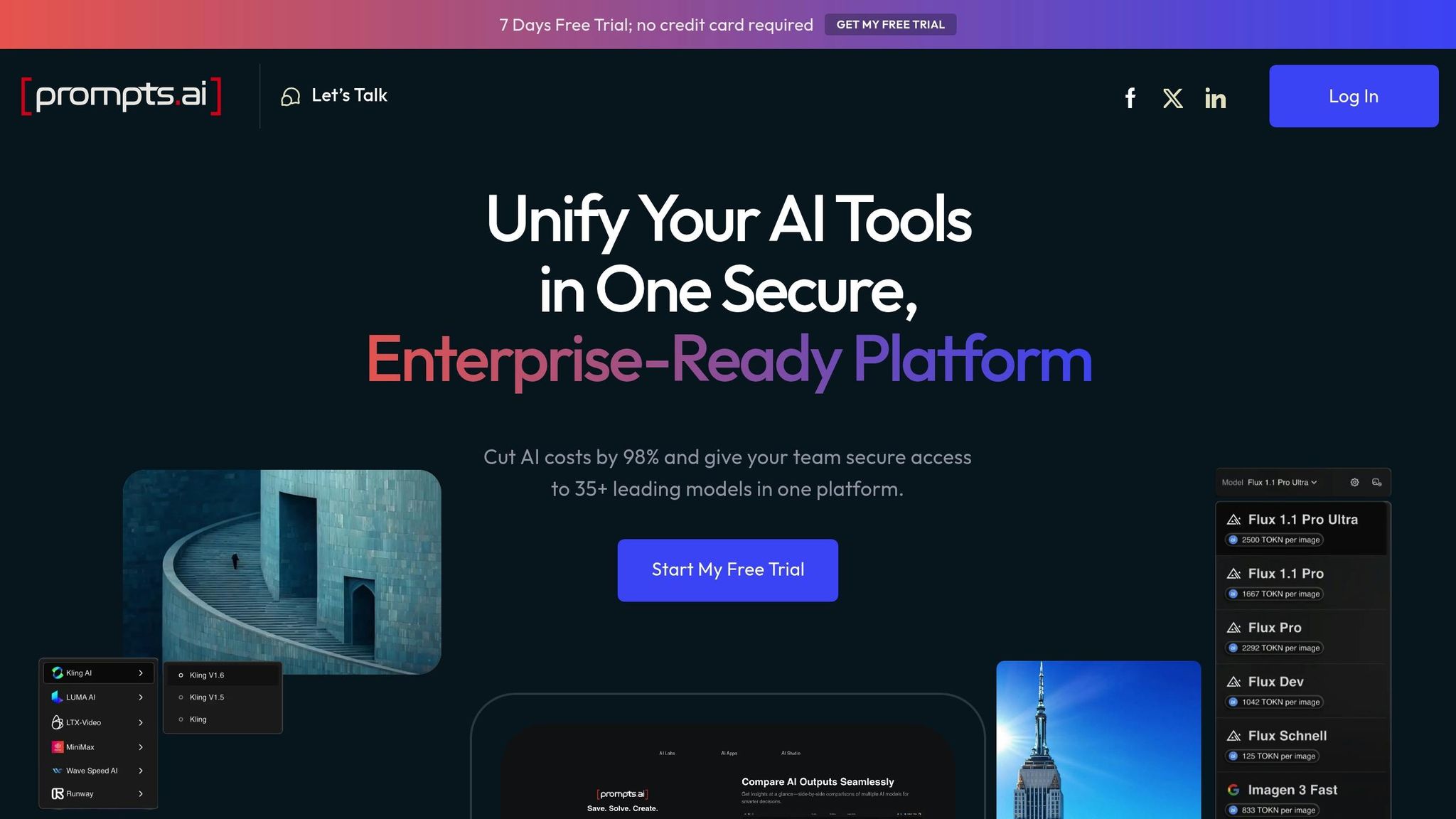
Prompts.ai is a platform tailored for enterprise AI orchestration, bringing together over 35 leading language models - such as GPT-4, Claude, LLaMA, and Gemini - into a single, business-focused interface. It simplifies scaling by eliminating the complexities of managing multiple tools and subscriptions.
The platform tackles "AI tool sprawl", which often results in unnecessary costs and inefficiencies. By consolidating tools into one interface, businesses can easily compare model performance, manage AI spending, and maintain centralized governance.
Prompts.ai’s unified dashboard allows businesses to integrate multiple models into a single workflow. This seamless integration enables companies to embed AI capabilities into their existing systems without requiring major technical changes.
Teams can create prompt workflows that automatically route tasks to the most suitable models. This ensures optimal performance and cost-efficiency, simplifying operations across various projects.
Managing AI expenses becomes straightforward with Prompts.ai’s pay-as-you-go TOKN credit system, which removes the need for recurring monthly fees. The system tracks every token used across models and teams, providing clear visibility into spending.
The platform’s financial operations module (FinOps) offers real-time cost monitoring, helping finance teams link AI expenses directly to business outcomes. Companies can achieve up to 98% savings while gaining detailed insights for budgeting and measuring ROI.
Prompts.ai is designed to grow alongside your business, whether you’re a small team or a Fortune 500 company. New users, models, and teams can be added in minutes, with the platform automatically managing increased workloads without compromising performance.
Enterprise clients also benefit from dedicated onboarding support and training, including a Prompt Engineer Certification program. This initiative helps businesses build in-house AI expertise as they expand their operations.
Prompts.ai transforms one-off AI experiments into structured, repeatable processes. The platform offers customizable pre-built "Time Saver" workflows, which teams can adapt to their needs while maintaining compliance through detailed audit trails. This supports the goal of reducing tool sprawl and ensuring streamlined AI governance.
Automation extends to selecting and optimizing models, automatically routing tasks to the most cost-effective option that meets quality standards. Teams can also implement approval workflows for sensitive tasks and set usage limits to control expenses.
The platform prioritizes security and governance, safeguarding sensitive data across all workflows. Comprehensive audit trails document every AI interaction, ensuring compliance with industry regulations and standards.
Administrators can define granular access permissions, restricting model and data usage to authorized teams. This robust governance framework is especially valuable as organizations scale their AI operations across departments and use cases.
With these integrated features, Prompts.ai enables businesses to innovate effectively while scaling AI operations with ease.

Domo combines powerful data visualization with workflow automation, earning recognition as a leader in embedded BI, analytics, and data governance for an impressive 31 consecutive quarters.
Domo Workflows, a low-code automation tool, simplifies complex data processes through visual flows designed for ease of use - even for non-technical users. Its AI-driven features enhance automation with tools like anomaly detection, automated SQL queries, and intelligent alerts. Updates in August 2025 introduced Workflow AI Agent Task 2.0, which now includes a revamped configuration interface and a Knowledge tab for real-time data referencing.
Here’s how businesses are leveraging these capabilities:
These examples highlight how Domo’s workflows not only enhance operational efficiency but also adapt to the evolving needs of businesses.
Domo Workflows are built to grow with your business. They handle increasing workloads effortlessly, managing high volumes of executions without requiring manual oversight. The platform’s AI Agents further enhance scalability by predicting trends and instantly triggering workflows, ensuring businesses can adapt to new challenges and opportunities.
Domo eliminates data silos by integrating seamlessly with internal systems, external APIs, and third-party applications. This creates a unified environment where data flows freely across all business functions. The August 2025 update added File and FileSet Entity Data Types, making it easier to reference and map data from individual files and directories within workflows.
Security and compliance are at the core of Domo’s design. Alongside its automation and scalability, the platform embeds robust governance features to maintain data integrity and regulatory compliance. For example, a global healthcare company utilized Domo to automate its annual user license audit, demonstrating the platform’s ability to manage sensitive regulatory tasks with precision.
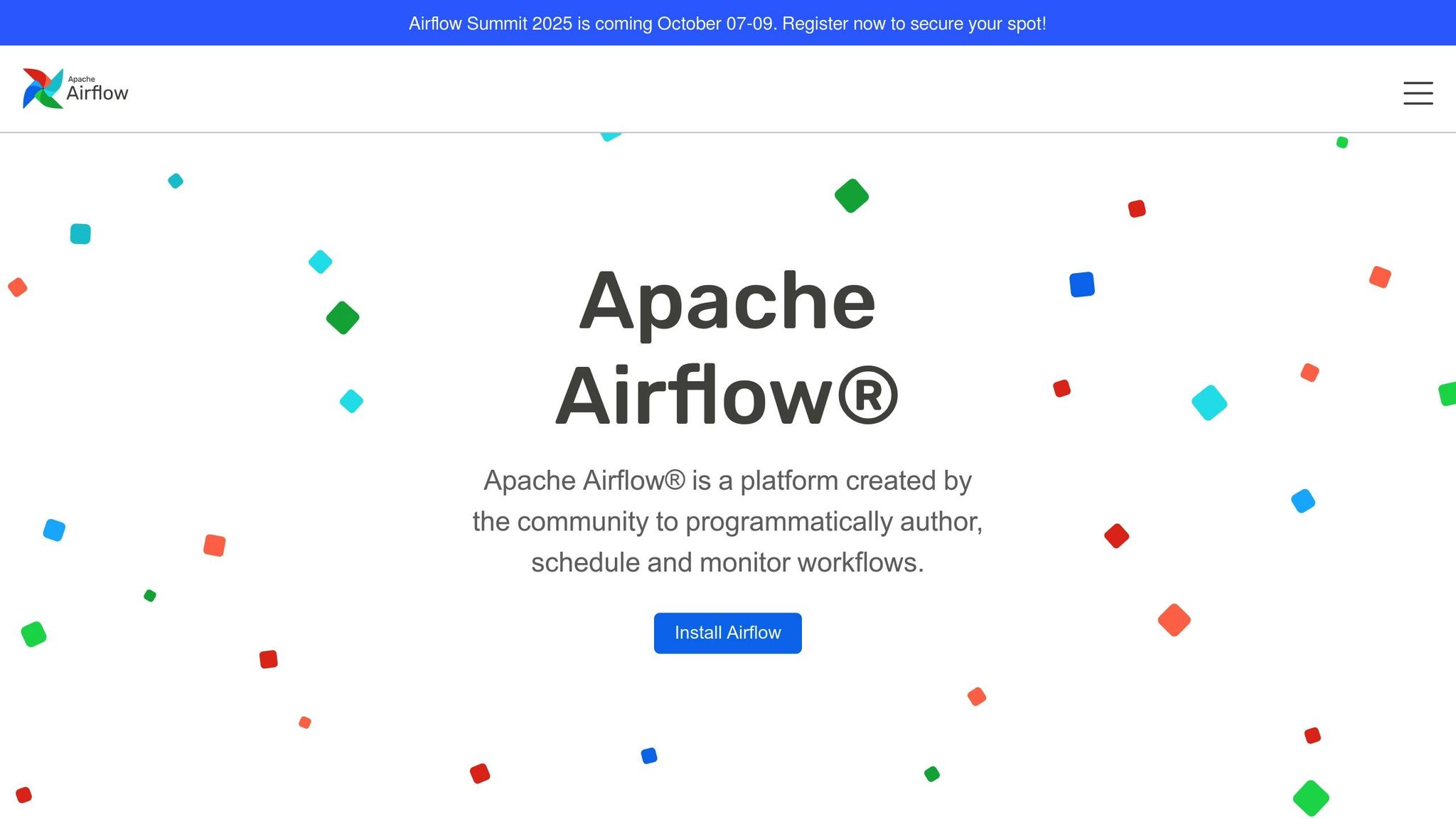
Apache Airflow is an open-source platform designed to orchestrate data workflows using directed acyclic graphs (DAGs). Over time, it has become a key tool for businesses managing complex AI and machine learning pipelines.
Apache Airflow simplifies multi-step AI processes by breaking them into smaller, interconnected tasks. These tasks are displayed as visual DAGs, making it easier to map dependencies, monitor progress, and track data flow from ingestion to model deployment. Teams can also automate retraining schedules for machine learning models, ensuring workflows stay up to date.
The platform excels in scheduling and monitoring workflows. Data scientists can automate tasks like retraining models, while operators receive alerts if tasks fail or exceed runtime limits. Its web-based interface offers real-time insights into workflow status, helping teams identify and resolve bottlenecks before they disrupt operations.
Airflow’s task retry mechanisms are especially useful for workflows reliant on external data sources or APIs. When temporary failures occur, the system automatically retries tasks based on set rules, ensuring processes complete without requiring manual intervention.
With its distributed architecture, Apache Airflow supports enterprise-scale AI operations. It works with multiple executors, such as Kubernetes and Celery, to distribute tasks across hundreds of worker nodes. This setup is particularly valuable for organizations running large-scale machine learning experiments or processing vast datasets across different regions.
The platform’s dynamic task generation feature allows workflows to adjust to runtime conditions. For example, if an AI pipeline detects an increase in data volume, it can automatically create additional processing tasks to maintain consistent performance. This adaptability ensures workflows remain efficient, even with fluctuating workloads.
Apache Airflow boasts a broad provider ecosystem, enabling seamless integration with major cloud platforms, databases, and AI frameworks. Its REST API allows businesses to manage workflows programmatically, making it easy to integrate Airflow with DevOps tools and CI/CD pipelines. Teams can trigger workflows, monitor their progress, and retrieve logs directly through standardized API calls.
Custom operators further expand Airflow’s capabilities, allowing organizations to connect with proprietary systems or specialized AI platforms. By building reusable components, teams can ensure consistency across various AI projects, fostering a unified approach to workflow management.
As an open-source tool, Apache Airflow eliminates licensing fees while offering enterprise-level workflow orchestration. Businesses only need to cover infrastructure expenses, making it a cost-effective choice for startups and budget-conscious organizations.
The platform also helps control costs through resource optimization. Features like task queues prevent resource contention, and configurable worker pools prioritize critical workflows. Logging and metrics provide visibility into inefficiencies, helping teams fine-tune resource usage.
Apache Airflow supports role-based access control, allowing administrators to assign specific permissions to different user groups. This ensures that data scientists only access workflows and connections relevant to their projects, aligning with enterprise security standards.
The platform also ensures encrypted connections for databases and APIs, safeguarding sensitive data as it moves through pipelines. Built-in audit logging tracks user actions and workflow executions, offering the documentation necessary for meeting regulatory requirements in industries such as healthcare and finance.
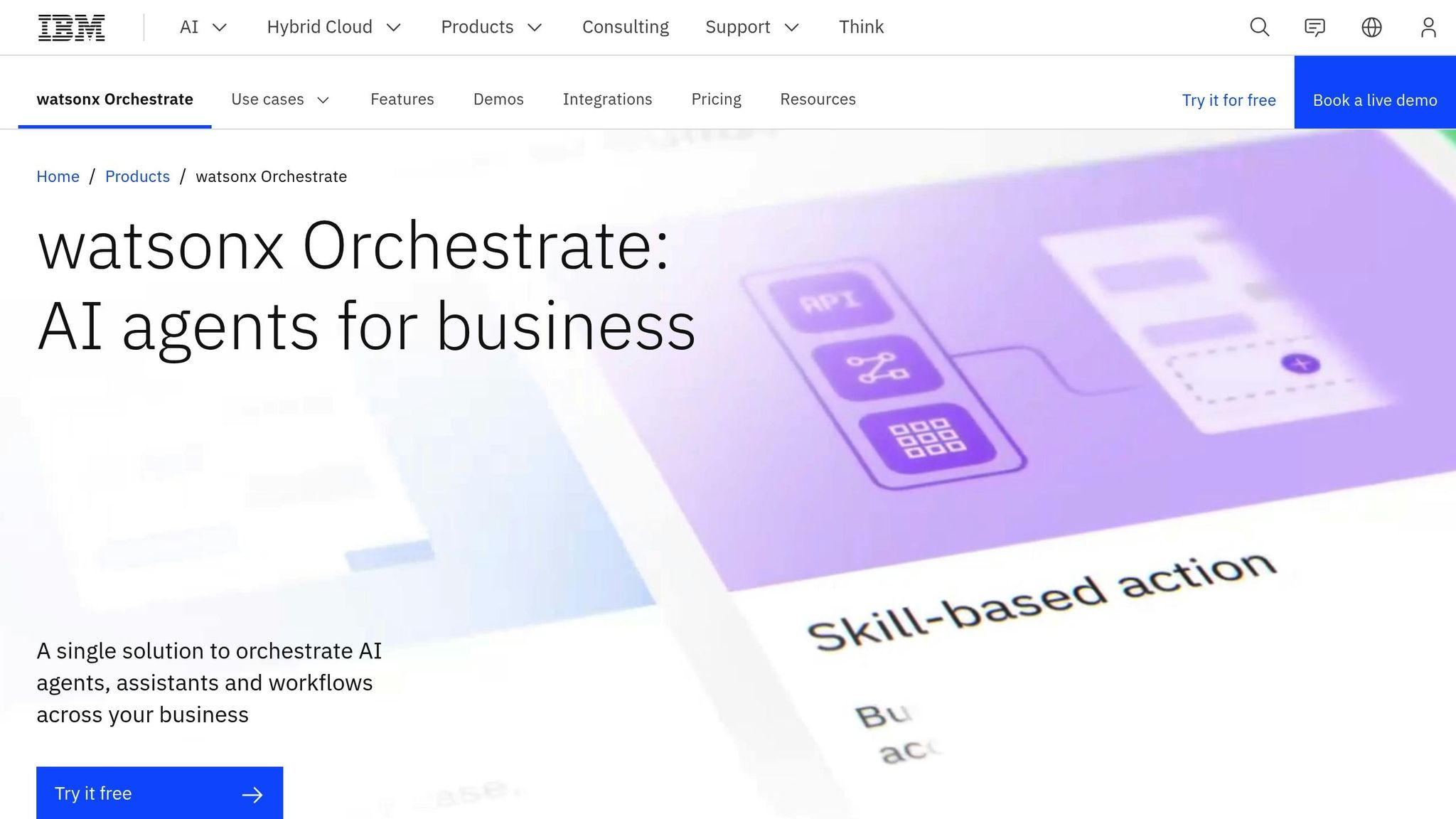
IBM watsonx Orchestrate connects effortlessly with your current business systems and supports integration with any AI model, providing unmatched flexibility. This capability ensures smooth operations and simplifies workflow automation, even in the most intricate environments.
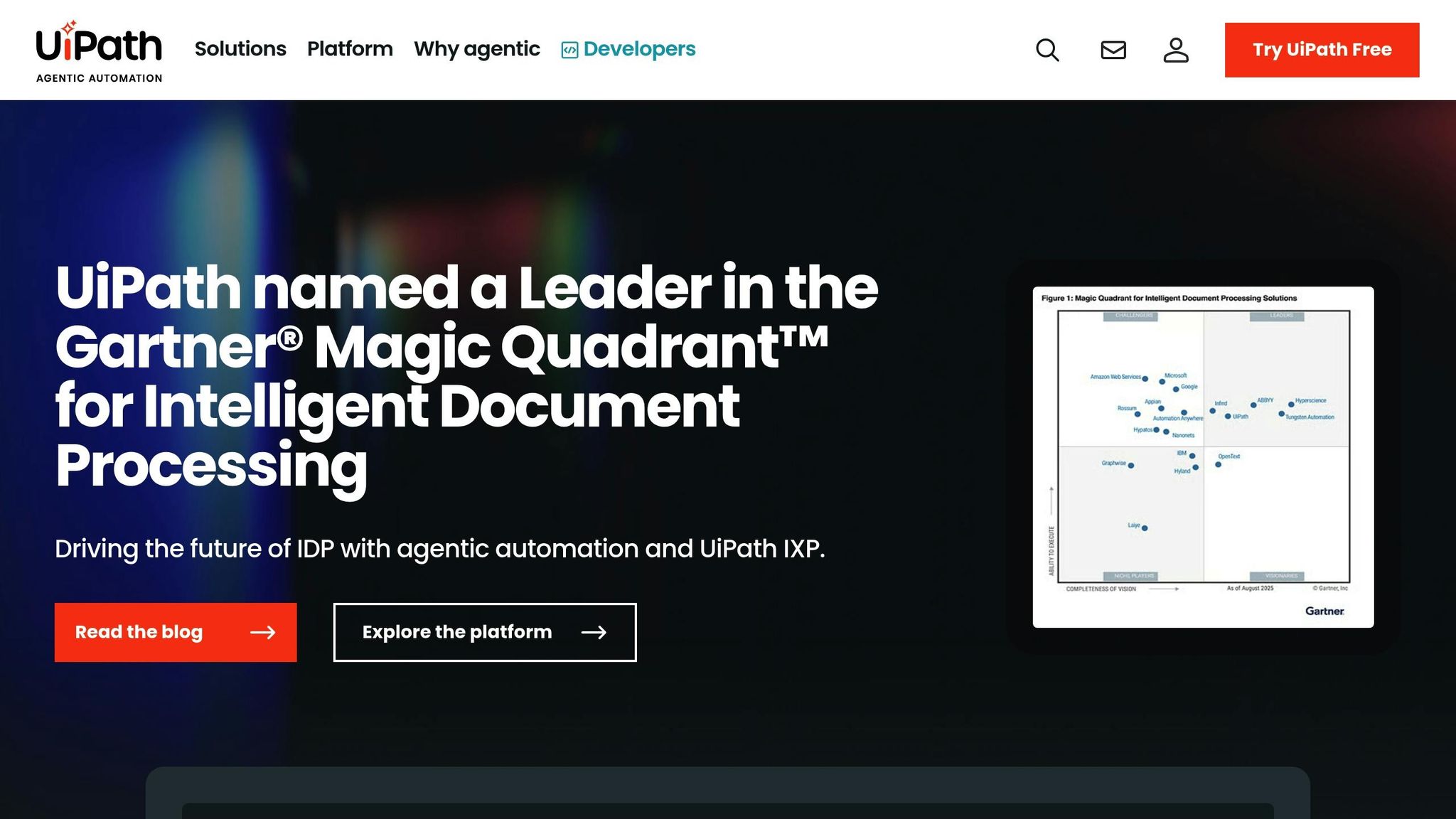
UiPath Agentic Automation stands out as a platform that combines robotic process automation (RPA) with artificial intelligence to streamline workflows and improve decision-making. By merging traditional process management with advanced AI capabilities, it offers businesses a powerful tool to enhance efficiency.
The platform excels in automating repetitive tasks while adapting processes dynamically. This minimizes the need for constant human intervention and promotes ongoing optimization, allowing teams to focus on more strategic initiatives.
Built to support enterprise-level demands, UiPath Agentic Automation’s cloud-based infrastructure scales effortlessly to handle fluctuating workloads. Its centralized control system ensures smooth coordination across departments, making it easy to expand automation efforts as business requirements evolve.
Security is a cornerstone of the platform, with role-based access controls and detailed audit trails providing robust oversight. Data is protected through advanced encryption during both transmission and storage, meeting stringent industry security standards to ensure compliance.
Designed with an API-first approach, UiPath Agentic Automation integrates seamlessly with a wide range of business applications and legacy systems. This compatibility enables organizations to incorporate automation into their existing IT ecosystems without the need for extensive customization.
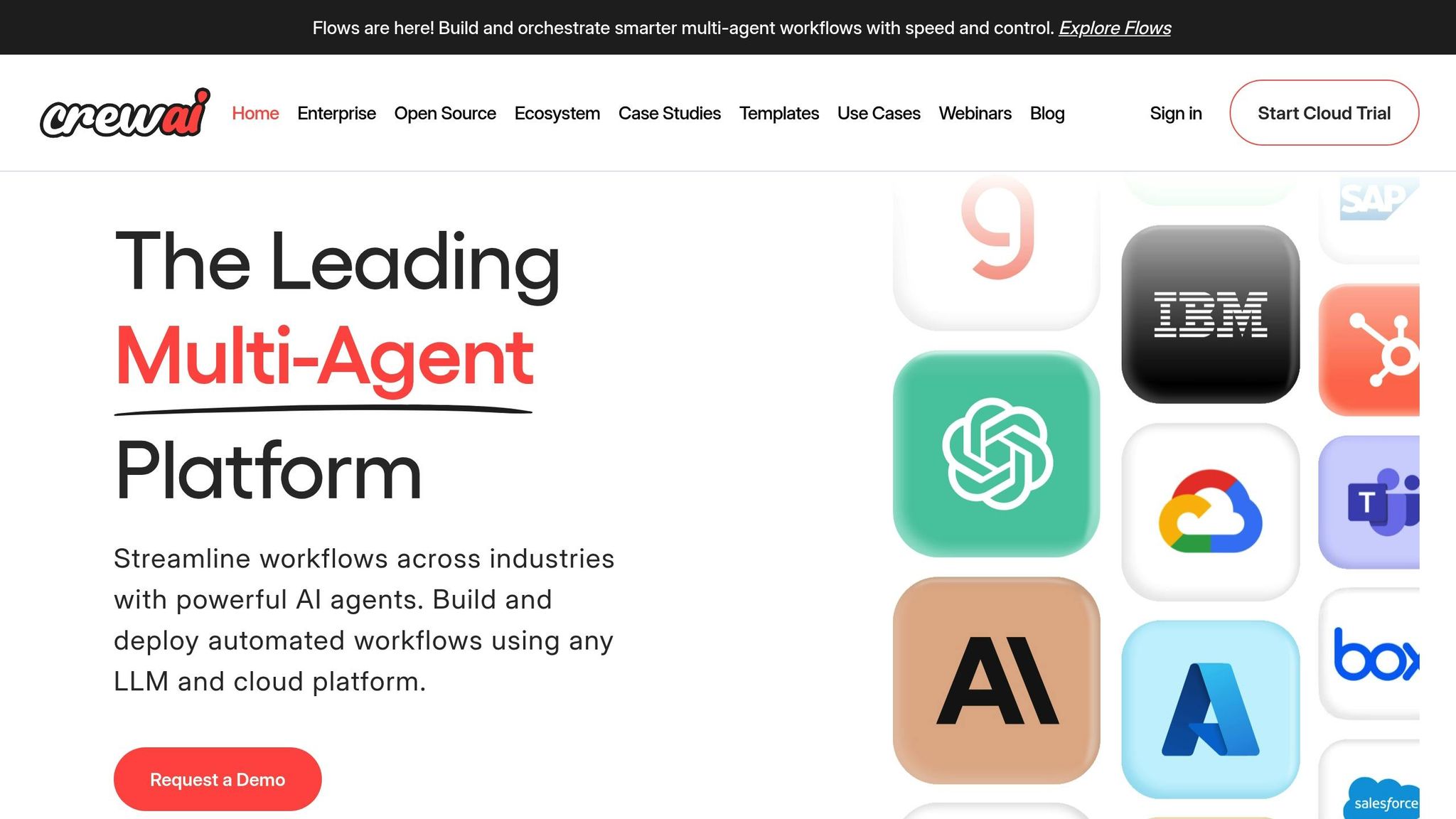
CrewAI is a dynamic platform that uses multiple AI agents, each with specific roles, to tackle tasks simultaneously. This setup enhances how operations are carried out by improving both speed and efficiency.
With CrewAI, specialized agents are assigned to handle distinct tasks within a process. These agents work together in real time, whether tasks need to be synchronized or performed independently, ensuring smooth and efficient operations.
CrewAI is designed to grow with your needs. It can effortlessly adjust to handle higher workloads without sacrificing performance, making it a reliable solution for businesses of any size.
Thanks to its robust API and adaptable plugins, CrewAI integrates smoothly into your existing systems, ensuring compatibility and ease of use.
CrewAI prioritizes data protection by implementing strong security measures to keep communications between agents and workflows safe from potential threats.
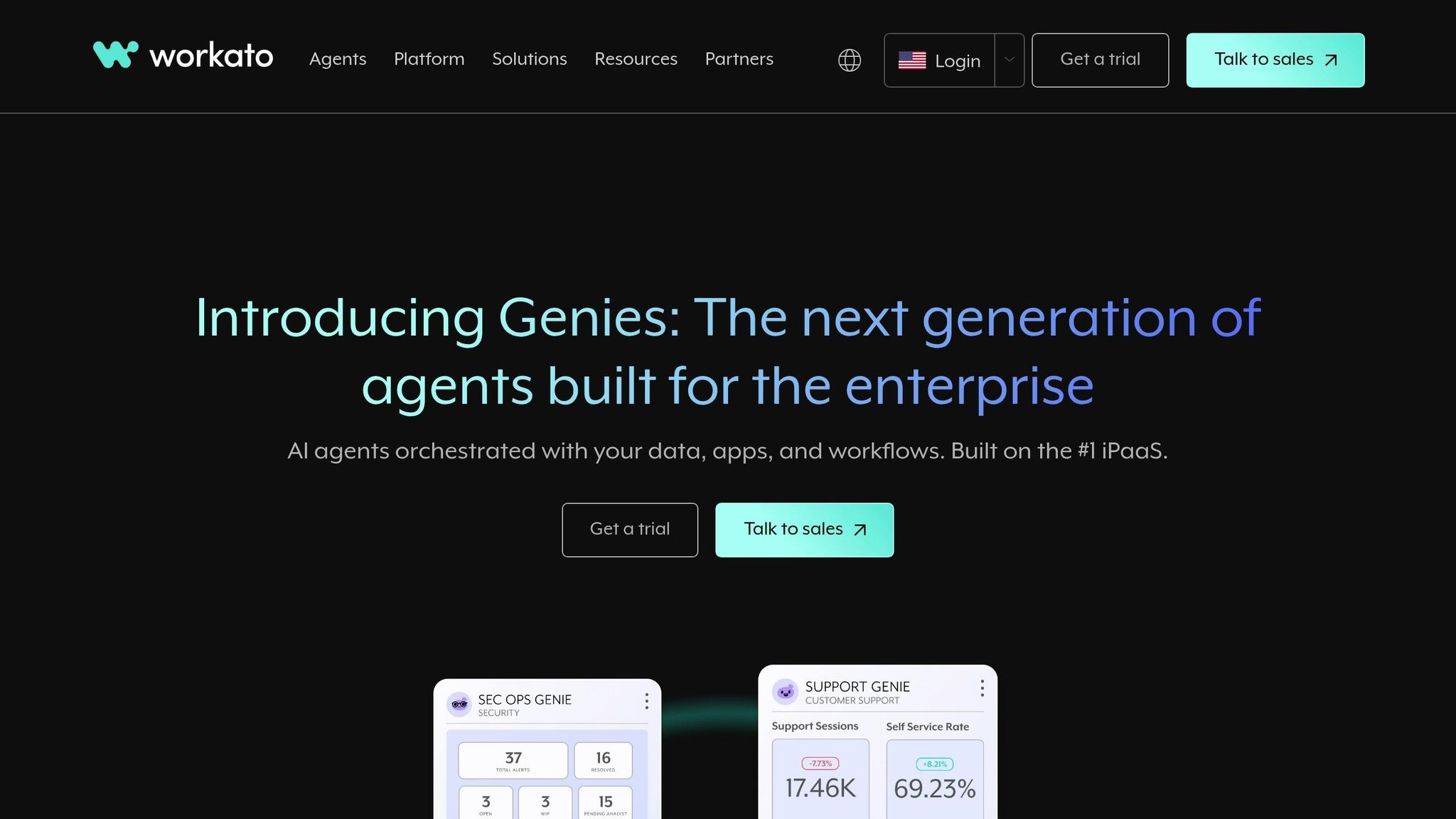
Workato is a high-performance platform designed to connect applications, data, and processes within an enterprise. It simplifies complex workflows, making it an excellent choice for businesses managing intricate technology ecosystems.
Workato's automation is built around recipes - intuitive, visual workflows that allow users to connect applications and trigger actions without needing advanced coding skills. These recipes can manage everything from straightforward data transfers to intricate, multi-step processes involving multiple teams and systems.
The platform also leverages machine learning to refine workflows over time. By analyzing usage patterns, it identifies areas for optimization, ensuring processes become more efficient as they evolve.
This strong foundation in automation is complemented by robust integration and security capabilities.
One standout feature of Workato is its extensive library of pre-built connectors, covering over 1,000 applications. This includes widely-used tools like Salesforce, ServiceNow, NetSuite, and Microsoft Office 365, as well as niche industry software. For unique or proprietary systems, Workato's universal connector framework allows IT teams to create custom integrations.
Additionally, Workato's API management tools enable businesses to expose their workflows as APIs. This enhances collaboration between systems, creating a more unified and interactive technology environment.
Workato prioritizes enterprise-grade security. It is SOC 2 Type II certified and adheres to key standards such as GDPR, HIPAA, and PCI DSS. Data transmissions are encrypted with TLS 1.2 or higher, and the platform integrates with enterprise identity providers for single sign-on (SSO) functionality.
Administrators can use role-based access controls to define who can access specific workflows and data. Detailed audit trails further enhance security by tracking all automation activities, helping organizations meet regulatory requirements with ease.
With its cloud-native design, Workato can scale effortlessly to meet changing demands. The platform processes millions of transactions daily for enterprise clients and handles sudden spikes in activity without compromising performance. Its elastic infrastructure dynamically adjusts resources to ensure consistent operation, even during peak usage.
For larger enterprises, Workato offers dedicated cloud instances. These provide enhanced customization and isolation while retaining the scalability benefits of the platform.
Workato uses a task-based pricing model, where costs are determined by the number of automation tasks executed rather than by user count. This provides a flexible and predictable pricing structure that aligns with actual usage. Organizations can monitor their automation activity through detailed analytics, helping them manage and optimize costs effectively.
The platform offers tiered pricing plans tailored to different levels of integration complexity and task volumes, allowing businesses to choose options that fit their needs and budgets.
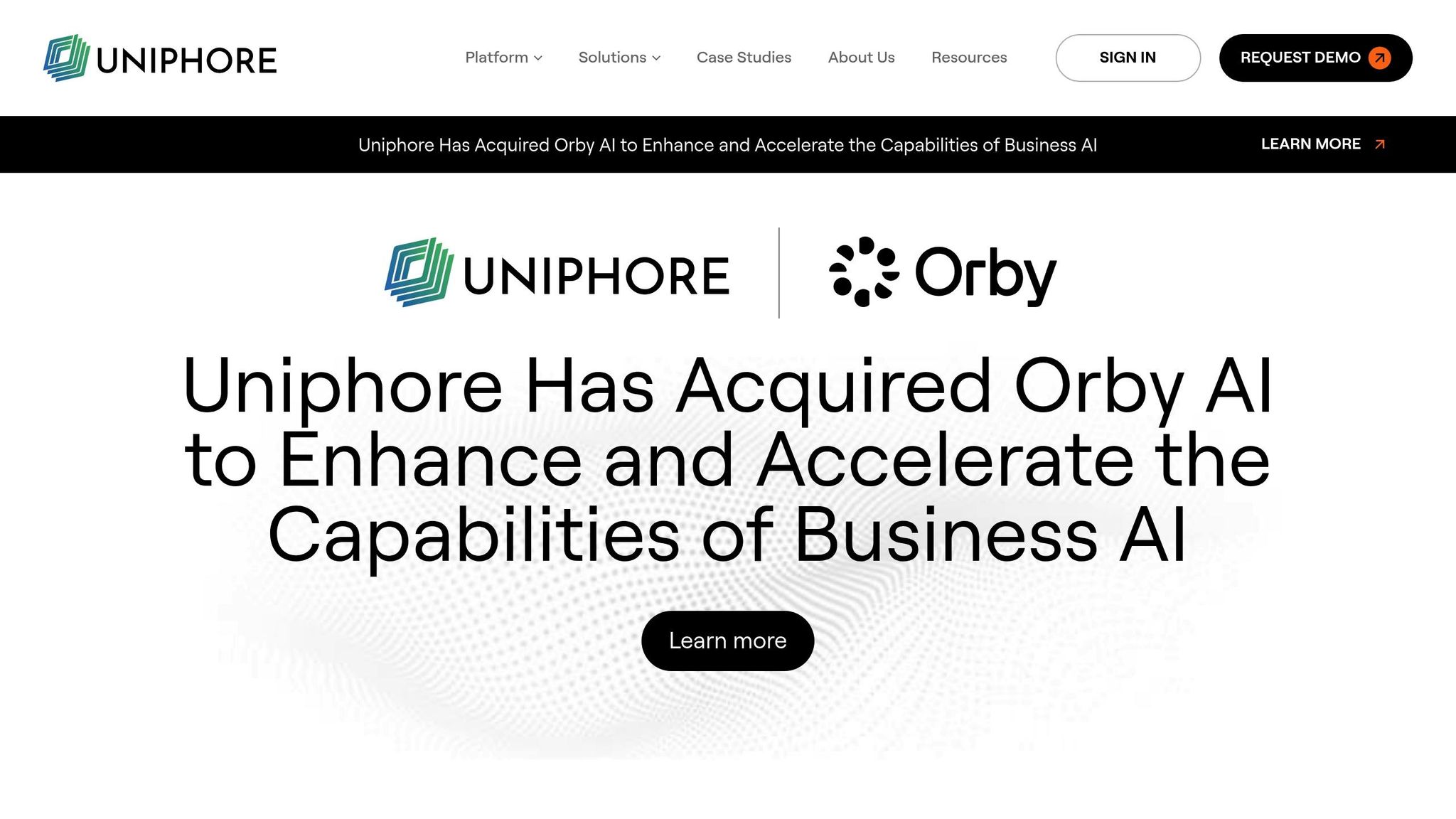
Orby AI is making its way into the AI landscape, emphasizing interoperable workflows that are essential for driving business progress. While its full range of features is still under development, early indications suggest a strong focus on integrating smoothly with existing systems. This emphasis on creating efficient interfaces aligns with the growing demand for scalable and cohesive AI solutions across industries.
The platform's development reflects a broader trend in the market - shifting toward unified and cost-efficient AI ecosystems. As Orby AI continues to evolve, its ability to meet these expectations will be a defining factor in assessing its strengths and limitations.
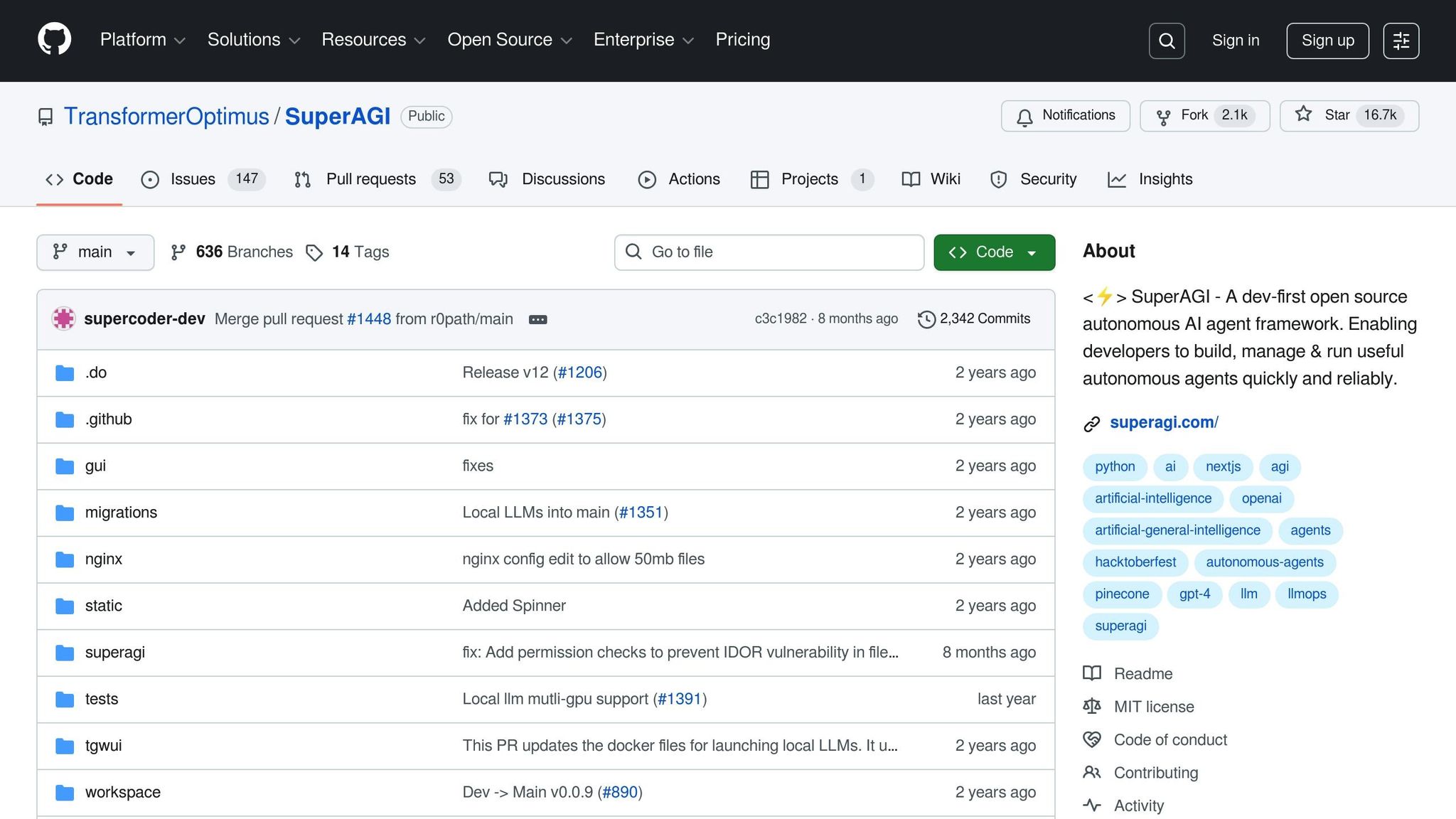
SuperAGI is an open-source framework designed to enable autonomous AI agents to manage workflows independently and efficiently. It allows businesses to deploy intelligent automation that operates in real time, adapting to changes without requiring constant human involvement.
SuperAGI coordinates multiple autonomous agents to tackle complex, multi-step processes. These agents can handle repetitive tasks while adjusting their strategies based on real-time data and evolving business needs. They work collaboratively, making independent decisions, executing tasks simultaneously, and communicating with one another to streamline workflows.
One standout feature is the ability of these agents to continuously improve. By analyzing past performance, they refine their methods over time, minimizing the need for manual adjustments. This self-improvement ensures that workflows become more efficient as the system matures.
SuperAGI is designed to integrate effortlessly into existing business environments. Its flexible API architecture and plugin ecosystem allow it to connect with databases, cloud platforms, and third-party applications. This eliminates the need for extensive custom development, as agents can access and manipulate data across multiple systems seamlessly.
The framework’s modular design makes it easy to incorporate into current technology stacks while maintaining compatibility with established workflows. This flexibility ensures businesses can adopt autonomous AI without disrupting their ongoing operations.
SuperAGI’s distributed architecture allows it to scale as workloads grow, deploying additional agents when necessary to handle increased demand. As an open-source platform, it provides transparency in costs, with businesses only needing to manage infrastructure expenses while benefiting from community-driven enhancements and support.
Security is a core focus, with configurable access controls and audit logging features ensuring operations remain compliant and properly monitored. These measures help maintain oversight and protect sensitive data.
SuperAGI’s capabilities open up new possibilities while presenting unique challenges, which will be examined further in the next section.
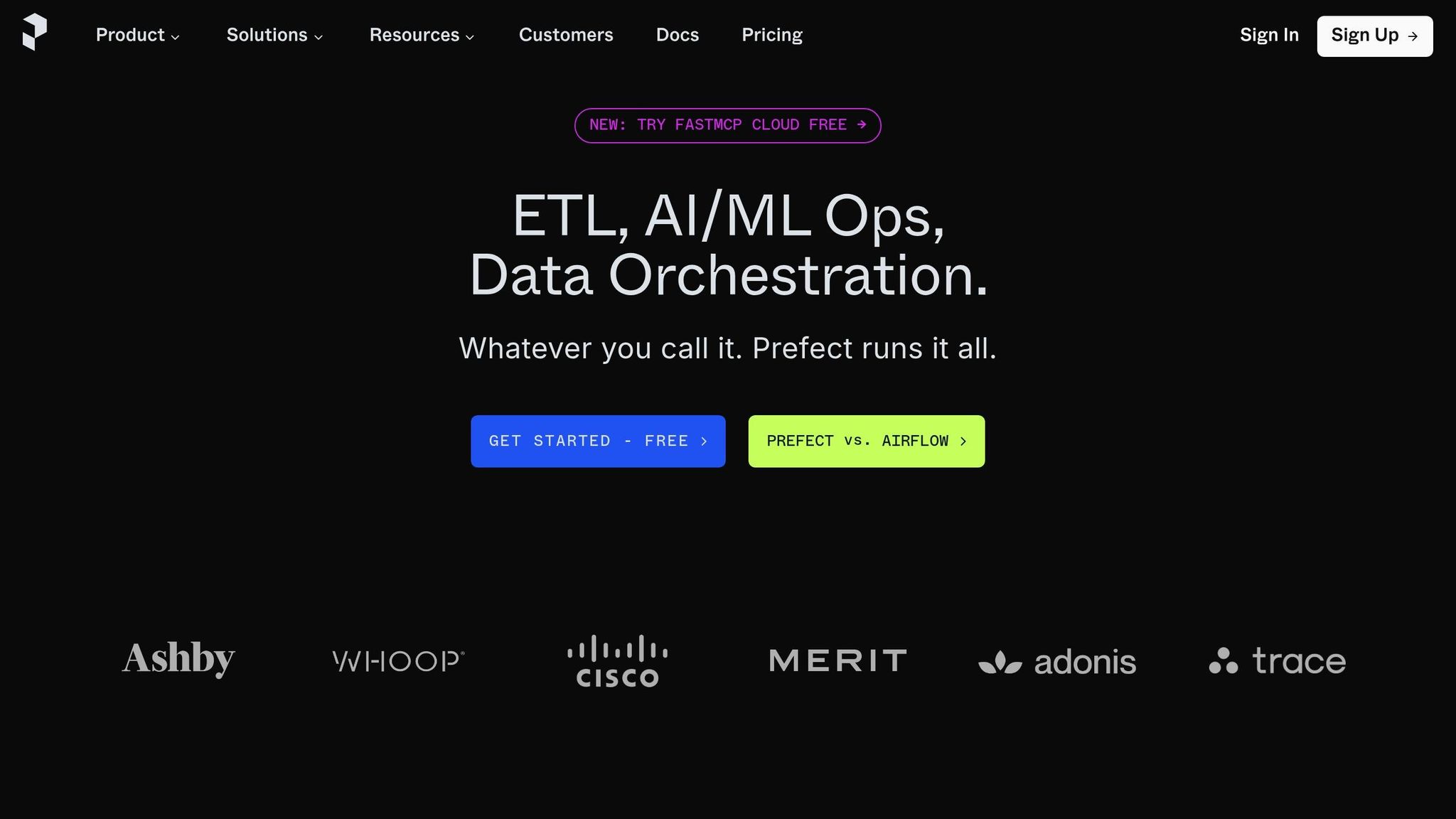
Prefect reimagines how businesses manage data pipelines by offering a Python-native orchestration platform. It simplifies complex automation, making it accessible for both data engineers and business teams. As companies strive for efficient and scalable automation, Prefect emerges as an essential tool for modern AI-driven operations.
Prefect takes automation to the next level with workflows designed to handle dynamic and unpredictable conditions. Its flows are built to adapt in real time, automatically addressing errors by retrying failed tasks, bypassing problematic steps, or rerouting processes to keep operations running smoothly.
Its scheduling capabilities extend far beyond basic time-based triggers. Workflows can kick off based on data availability, external events, or intricate conditions. For instance, a financial reporting process could wait for data from multiple sources to ensure completeness before generating reports.
Prefect offers flexibility with its hybrid execution model, running smaller workflows locally while distributing larger tasks across cloud environments or Kubernetes clusters. Its agent-based architecture efficiently allocates resources and ensures systems don’t get overwhelmed.
The platform also handles backpressure management intelligently. When upstream processes produce data faster than downstream systems can handle, Prefect throttles the flow to prevent performance issues. This ensures critical systems remain stable and supports the seamless workflows needed for AI-driven operations.
Prefect integrates effortlessly with major cloud platforms like AWS, Google Cloud, and Azure, as well as databases and business applications. Through its pre-built integrations, REST API, and GraphQL interface, it enables orchestration across diverse environments.
The platform supports multiple execution environments, allowing different parts of a workflow to run where they’re most effective. For example, sensitive data might be processed on-premises, while analytics tasks are executed in the cloud - all within the same cohesive workflow.
Prefect prioritizes security with role-based access controls, encrypted secrets management, and detailed data lineage tracking, helping businesses meet regulations like GDPR and HIPAA.
Its data lineage tracking offers clear visibility into how data moves through systems, which is essential for regulatory compliance. Organizations can document their data handling practices and provide audit trails, ensuring transparency and accountability.
Building on the earlier discussion of platform features, let’s weigh the strengths and challenges of different platforms, focusing on cost, compliance, integration, and security.
Prompts.ai stands out by bringing together over 35 language models into a single interface, using a pay-as-you-go system powered by TOKN credits. This eliminates recurring subscription fees and provides enterprise-grade governance with real-time FinOps controls, offering unparalleled insights into AI spending and usage. These features ensure strong compliance and security measures.
Other platforms may shine in areas like rapid deployment or open-source flexibility, but these benefits often come at the expense of integration and governance. Such compromises can affect long-term scalability and the ability to implement robust security frameworks.
Regulatory concerns also play a significant role in platform selection. With nearly half (48%) of global CISOs expressing concern over the rising security risks of AI, features like data privacy, encryption, and consistent policy enforcement become non-negotiable. Additionally, as the AI industry is projected to add $15.7 trillion to the global economy by 2030, businesses must weigh advanced technology capabilities against the total cost of ownership. Subscription-based models provide predictable costs, while pay-per-use options offer better alignment with actual usage, potentially enhancing cost efficiency.
Security is a critical factor, especially when platforms handle sensitive data. With cybercrime costs expected to exceed $23 trillion annually by 2027, platforms must adopt rigorous safeguards, including automated verification and oversight, to prevent vulnerabilities and breaches.
Choosing the right platform involves aligning trade-offs with business priorities - whether it’s interoperability, compliance, cost management, or automation. By carefully evaluating these factors, organizations can adopt solutions that support growth while maintaining strong security and regulatory standards.
Selecting the right AI platform hinges on aligning it with your specific goals and operational needs. Through careful evaluation, clear patterns emerge for addressing diverse business priorities. Here’s how businesses can tailor their choices effectively:
For enterprises focused on cost transparency and governance, Prompts.ai stands out as a comprehensive solution. It offers unified access to multiple language models through a pay-as-you-go system, paired with real-time FinOps controls. This setup can reduce AI software expenses by up to 98% compared to managing multiple standalone subscriptions, making scalable AI adoption both budget-friendly and predictable.
For those prioritizing compliance and security, platforms with robust protocols are essential. Prompts.ai addresses these needs with an enterprise governance framework that integrates secure data practices while allowing flexibility to incorporate new models as they emerge.
Organizations aiming for quick deployment will benefit from platforms featuring pre-built integrations and user-friendly interfaces. However, it’s important to balance the speed of deployment against long-term scalability. Factors like integration capabilities and total cost of ownership should not be overlooked.
While Prompts.ai excels in unified governance, other platforms such as UiPath and Domo offer specialized features that may appeal to specific use cases. UiPath Agentic Automation is a leader in robotic process automation, while Domo shines in analytics-driven workflows for data-heavy teams. These platforms can be valuable, though they often require additional tools to support end-to-end AI workflows.
Ultimately, the choice comes down to aligning the platform with your organization's core priorities. Businesses focused on flexibility and innovation will benefit from platforms offering adaptable models and cost control. Conversely, those in regulated industries should prioritize compliance features and detailed audit trails. For companies with distributed teams, centralized governance and real-time usage monitoring are key considerations.
The ideal platform will strike a balance between advanced functionality, robust security, and predictable costs. Success lies in choosing a solution that evolves with market demands while providing operational control and financial efficiency.
Prompts.ai streamlines AI cost management with its pay-per-use TOKN credit system, ensuring businesses only pay for the resources they actually use. This flexible model can reduce expenses by as much as 98% when compared to standard subscription plans.
The platform also offers real-time expense tracking and brings all AI tools together in one intuitive interface. This setup simplifies monitoring, helps optimize spending, and ensures users maintain complete control over their AI workflows.
When choosing an AI platform that emphasizes security and compliance, it's crucial to look for tools equipped with robust data protection features. These include encryption protocols like AES-256, role-based or attribute-based access controls, and detailed audit logging. Such measures help protect sensitive data while maintaining accountability across the system.
Additionally, confirm that the platform adheres to key industry standards like SOC 2 or GDPR, along with any other regulations relevant to your business. Features such as data minimization, secure storage methods, and integrated risk management can help mitigate vulnerabilities. Ensuring the platform meets your organization's specific compliance needs is essential for safeguarding information and fostering customer confidence.
Prompts.ai's automation tools are designed to simplify workflows, cutting down on repetitive tasks and untangling complex processes. Businesses using these tools can achieve up to a 40% reduction in process times and save 20–30% on costs, making operations smoother and more economical.
With the power of AI, Prompts.ai analyzes data and forecasts trends, helping businesses make decisions faster and with greater confidence. This capability allows companies to respond swiftly to market shifts, allocate resources effectively, and stay nimble in their operations. The outcome? A workplace that operates more efficiently, stays ahead of changes, and keeps expenses in check.


